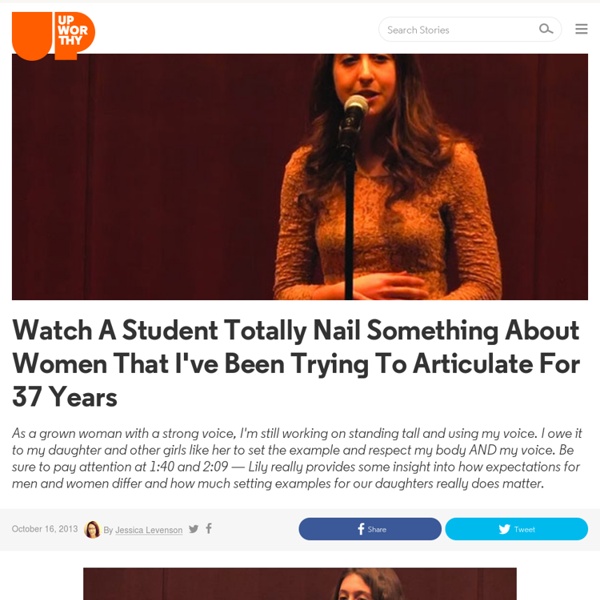Domestic violence deserves the 'one punch' treatment and laws changed to protect women at work
Earlier this year, the media's response to alleged "one-punch" killings was undoubtedly a highly successful campaign for legislative change. It sparked outcry across the country as governments scrambled to implement harsh, and arguably ineffective, legislation to address and prevent senseless violence. In stark contrast, despite significant campaigning over several years by various legal, social and government peak bodies, simple protections against the discrimination of women who are the victims of domestic violence are yet to be legislated.
Short Hair: A Love Story
I’d always had long hair. But more than having long hair, I had hair which, by our society’s beauty standards, was “beautiful” – long, silky, and straight. I had people, even complete strangers, compliment me on my locks. Some people would even tell me how beautiful I was just because of it.
Little surprise here: women expected to do more at home – and at work
No matter what profession a woman works in, she's actually in the service profession. That's the upshot of an illuminating (and to many, enraging) new Columbia Business School study highlighted this week, showing that co-workers and bosses feel entitled to favors from women – or, in fact, that almost everything a woman does at work is considered "a favor" that is off the clock. To put it another way, when a woman takes on a project no one else will, or does something helpful or thoughtful, it's seen as something she does for fun.
24 Rules Of Seduction
'Targets with active minds are dangerous: If they see through your manipulations, they may suddenly develop doubts. Put their minds gently to rest, and waken their dormant senses, by combining a nondefensive attitude with a charged sexual presence. While your cool, nonchalant air is lowering their inhibitions, your glances, voice, and bearing -- oozing sex and desire -- are getting under their skin and raising their temperature. Never force the physical; instead infect your target with heat, lure them into lust. Morality, judgment, and concern for the future will melt away.' Source: Robert Greene's 'The Art of Seduction'
Seduced by the Illusion: The Truth About Transformation Photos
There is no doubt that we live in a world of manipulation, false promises and exaggerated claims. This is especially true in the fitness industry. I’ve been a personal trainer for more than 11 years, and clients and friends are always telling me about the next amazing diet or exercise program.
On Labeling Women 'Crazy'
I've had to quit telling stories about crazy exes or women I've dated. The problem was that I started realizing that when my friends and I would talk about our crazy exes or what-have-you, more often than not, we weren't talking about ex-girlfriends or random dates who exhibited signs of genuine mental health issues. Now I did have a few where I would qualify my story with, "No, I don't mean 'we broke up and I can't be bothered to figure out where things went wrong, I mean that she was diagnosed with borderline personality disorder and was starting to show signs of genuine paranoia," but for the most part, crazy meant "acting in a way I didn't like." And I didn't realize just how damaging this attitude was in the way I related to women. Part of my journey toward getting better with women was having to unlearn a lot of old attitudes and habits when it came toward dealing with the opposite sex.
Send This Instead » App
The “Send this Instead” app empowers kids giving them a voice when they are under pressure to send intimate images of themselves online. We asked all the funny people we knew, “What would you say if someone asked you to send images you didn’t want to?” We took their answers and made posters and developed this app. The posters are witty, sarcastic and meant to help get the point across – using humor as a strategy.
MelVFitness: The hidden truths behind a transformation pic!
After some serious 'like-age' on my recent Instagram post I thought i'd share with you the motivation behind the post and also a bit of truth when it comes to transformations. I opened the curtains, ditched my fwallet (threw them next to my crocs), stood taller, adjusted my posture to added a dash of self confidence and snapped the after.. pfft, who am i kidding.. I snapped about 25 afters. And after adding a filter and playing around with the zoom, I double checked with a friend that it was believable- I then posted my efforts on Insta.. and I've been VERY overwhelmed with the response.
Don’t be that dude: Handy tips for the male academic
There is a plethora of research on the causes of hostile environments for women in academia, and on why we have an underrepresentation of women in many fields. There are support groups for women, societies entirely devoted to women academics (broadly and field-specific), workshops for women in academia, and countless articles and blogs devoted to the topic. These initiatives are important, but here’s the thing: gender equality has to be a collaborative venture. If men make up the majority of many departments, editorial boards, search committees, labs and conferences, then men have to be allies in the broader cause of equality, simply because they have more boots on the ground.
It’s time to make emotional abuse a crime
It’s 5am and I can’t sleep. A quiet dawn is bringing the colour back to the world outside, but in here it’s still dark. I’m worried about my friend, who is beautiful, kind, smart (it feels important to note that she’s smart – some people still think “women like her” aren’t), and trying to extricate herself from an abusive relationship. He is out of the house, but not her head. This second eviction isn’t the most urgent, but until it is complete she won’t be free.



